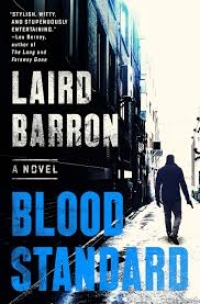
Published by G.P. Putnam's Sons on May 29, 2018
Some of my favorite crime novels focus on criminals, who tend to be more interesting and less self-righteous than cops or private detectives or lawyers. Isaiah Coleridge, a big guy of Maori descent, falls into the category of interesting criminal. He fancies himself as the broad shouldered bad guy in a Bond film who kills people on behalf of the archvillain (presumably he has Oddjob in mind). He’s been dispatched to Alaska, an outpost of the Chicago mob, to help Vitale Night intimidate some underperforming subordinates.
Coleridge makes trouble for himself by punching Night in the throat when Night’s crew begins to slaughter walruses for their ivory. Only his father’s intercession keeps Coleridge alive after the incident with Night. Coleridge has an iffy relationship with his father, who was involved in the death of Coleridge’s mother. That’s one of many features of Coleridge’s past that add complexity to his character.
No longer welcome in Alaska, Coleridge is exiled to New York because the New York mob, unlike the Chicago mob, doesn’t want to kill him. He ends up on a farm in the Hudson Valley owned by Virgil and Jade Walker, two scholars who lecture about the classics when they aren’t bailing hay. The other hired hand is an ex-soldier named Lionel Robard. The Walkers’ granddaughter, Reba, spends weekends on the farm while she “gets over some troubles” from the city. Most of the plot is driven by Coleridge’s attempt (sometimes assisted by Robard) to get to the bottom of Reba’s disappearance while looking over his shoulder to see if Night has landed in New York.
The meandering plot in Blood Standard might inspire a reader to create a flowchart to sort out the relationships between the characters. It draws on a lesson moviegoers learned from The Godfather: just when Coleridge thinks he’s out, the mob pulls him back in. Or at least it tries. But so do other criminal gangs, because criminals with Coleridge’s skills and size aren’t easy to find. Coleridge’s problems with the mob are compounded by problems with the local cops and the FBI and a group of mercenaries and some wealthy New York socialites, not to mention getting himself into the middle of an ethnic gang war. It’s hard to say which adversary is a greater menace. Fortunately, Coleridge has tough skin, a hard head, and a whole lot of fat protecting his vital organs.
Blood Standard mixes dark humor with crime drama. Coleridge is a fun character, if you think a man who is “the essence of violence” can be fun. As criminals go, Coleridge at least has the virtue of being incorruptible, which can’t be said of most of the novel’s law enforcement characters. He’s fond of quoting the classics, perhaps because epic heroes tend to be very violent dudes. He loves and protects dogs (and walruses), a virtue that (to my way of thinking) offsets a good bit of the harm he does to humans, most of whom deserve it. He stands up for his friends even if he knows he’ll pay a price. It’s hard not to like the guy.
The story has moments of action — violent action, to establish Coleridge’s credentials — but the story doesn’t depend on gratuitous violence for its pace. The violence comes at the right moments, punctuating a story that is more about the anticipation of violence than violence itself. The resolution of Reba’s disappearance is almost beside the point, but the plotline does get resolved. The resolution of Coleridge’s problem with Night is tense, surprising, and satisfying. If you enjoy rooting for the criminal in a crime novel, Blood Standard is a good choice.
RECOMMENDED